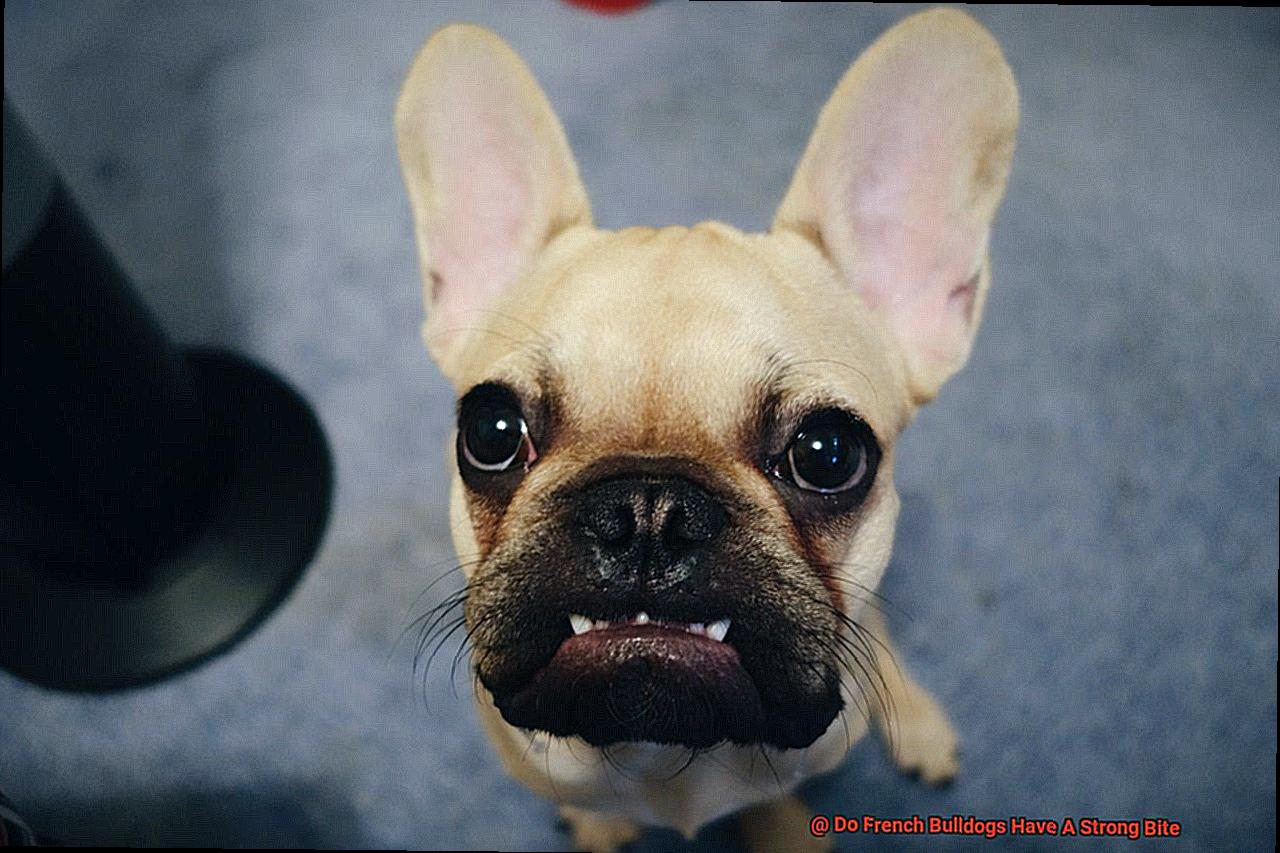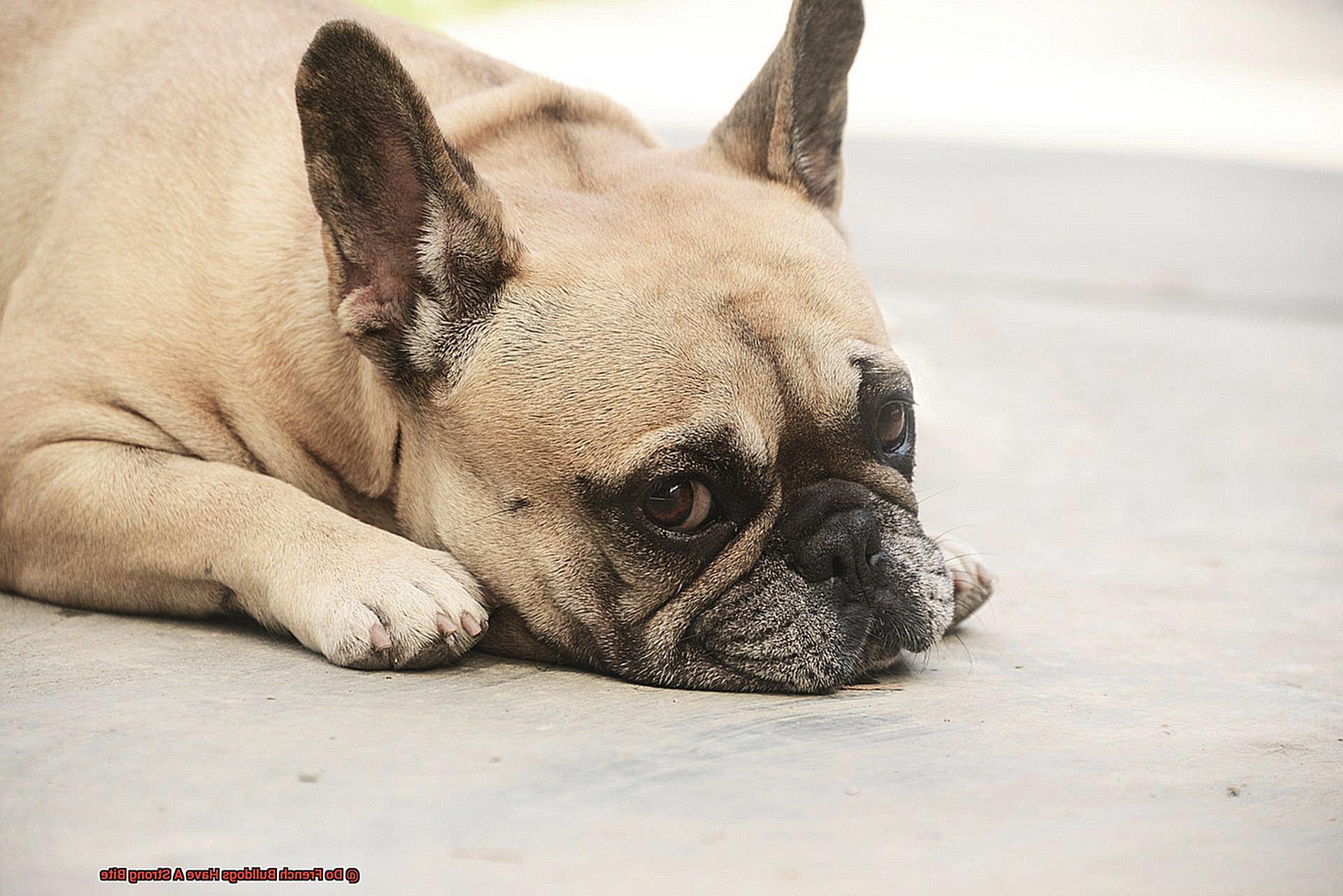Do French Bulldogs Have A Strong Bite?
Ever wondered if those adorable French Bulldogs have a bite that packs a punch? These pint-sized pups, with their charming expressions and lovable personalities, have captured the hearts of dog enthusiasts everywhere. But let’s address the elephant in the room – the myth that French Bulldogs have a jaw strength to rival their larger counterparts. In this blog post, we’re here to set the record straight about the true strength of a French Bulldog’s bite.
Sure, French Bulldogs have a distinctive face structure, thanks to their brachycephalic features. But let’s not get carried away with exaggerations about their biting power. You see, this misconception stems from their historical association with dogfighting, where their ancestors were bred for toughness and resilience. However, it’s important to acknowledge that French Bulldogs have come a long way in terms of evolution – both physically and temperamentally – especially in recent times.
To understand the real bite force of these lovable pooches, we need to delve into their anatomy. While their snouts may be shorter compared to other breeds, they compensate with wide and square-shaped muzzles. Additionally, French Bulldogs possess strong jaws capable of efficiently managing food and chomping on chew toys. Nevertheless, scientific studies reveal that their bite strength, measured in pounds per square inch (PSI), doesn’t reach the levels seen in more muscular breeds like German Shepherds or Rottweilers.
Now, let’s remember that “bite strength” isn’t just about jaw pressure; it also encompasses applied force. A dog’s biting capabilities depend on various factors such as size, genetics, and individual differences. Although French Bulldogs weren’t primarily bred for powerful bites like some other breeds, they can still deliver a significant nip relative to their petite frames.
In the upcoming sections of this blog post, we’ll dive deeper into the specifics of French Bulldogs’ bite strength. We’ll also explore their temperament and discuss how proper training and socialization play a crucial role in shaping the behavior of these delightful four-legged companions. So, stay tuned as we unravel the truth behind the myth and equip you with the knowledge to appreciate the unique traits and characteristics of this breed.
Examining the Bite Force of French Bulldogs
Contents
- 1 Examining the Bite Force of French Bulldogs
- 2 The Anatomy of a French Bulldog’s Jaw and Bite
- 3 How Does a French Bulldog’s Bite Compare to Other Breeds?
- 4 Training and Socialization for French Bulldogs: Preventing Biting Incidents
- 5 What Factors Affect the Strength of a Dog’s Bite?
- 6 Understanding Your French Bulldog’s Body Language and Signals
- 7 Tips for Responsible Ownership of a French Bulldog
- 8 Conclusion
In this blog post, we will delve into the anatomy, behaviors, and care needed to understand the bite force of French Bulldogs. So, let’s explore the jaw-dropping facts about their bite strength.
Anatomy of a Powerful Bite:
French Bulldogs may be small in size, but don’t let that fool you. Their strong jaws and well-developed muscles enable them to exert a significant amount of pressure when biting down. This is due to their compact and muscular build, which contributes to their ability to generate a formidable bite force.

Research Findings:
According to a study conducted by researchers at the University of New South Wales, French Bulldogs have an average bite force of around 305 pounds per square inch (psi). While this might not be as high as some larger breeds, such as the German Shepherd or Rottweiler, it is still considered quite strong for a small breed like the French Bulldog.
Temperament and Training:
It’s important to remember that a dog’s bite force does not necessarily correlate with aggression or potential harm. French Bulldogs are generally known for their friendly and sociable nature. However, responsible ownership and proper training are essential to ensure that they use their bite force in a safe and controlled manner.
Preventing Biting Issues:
To prevent any potential biting problems, it is crucial to provide proper training and socialization to your French Bulldog from an early age. This will help them become well-behaved and friendly companions. Additionally, satisfying their natural chewing instincts with appropriate chew toys and maintaining good dental care can reduce the risk of any biting-related issues.
French Bulldogs may not have the strongest bite force compared to some larger breeds, but they still possess a considerable amount of power in their jaws. By understanding their anatomy, providing proper training and care, and prioritizing responsible ownership, you can ensure that your French Bulldog uses their bite force appropriately and remains a loving and loyal companion.
The Anatomy of a French Bulldog’s Jaw and Bite
When it comes to understanding the jaw and bite of a French Bulldog, it’s essential to dive into their unique anatomy. These compact canines have a distinctive skull shape, known as brachycephalic, which sets them apart from other breeds. Let’s take a closer look at the key components of their jaw structure and how it influences their bite strength.
- The Maxilla: The upper jaw of a French Bulldog, scientifically referred to as the maxilla, is broad and powerful. It provides stability and strength to their bite. This robust upper jaw houses their upper teeth and plays a crucial role in chewing and biting down on objects or food.
- The Mandible: On the other hand, the lower jaw, called the mandible, is equally sturdy and supports the closing motion of the jaw during biting. It contains the lower teeth and works in harmony with the maxilla to exert force when biting down. Despite having a slightly undershot bite (where the lower jaw extends beyond the upper jaw), French Bulldogs can still pack a punch with their jaws.
- Strong Jaw Muscles: Behind every powerful bite lies strong jaw muscles. French Bulldogs have well-developed masseter muscles on the sides of their face. These muscles enable them to exert significant force when closing their jaws, allowing them to chew and bite with precision.
It’s important to note that while French Bulldogs possess a formidable bite, they are not considered to be among the breeds with the strongest bites. Breeds like Rottweilers or Pit Bull Terriers are known for their higher bite forces. However, don’t be fooled by their small size – French Bulldogs can still deliver a firm grip when it matters.
Several factors can influence a French Bulldog’s bite strength, including individual variation, size, health, and training. Just like humans, each dog has unique physical abilities. Regular dental care, proper nutrition, and appropriate exercise can contribute to the overall health and strength of a French Bulldog’s jaw and bite.
How Does a French Bulldog’s Bite Compare to Other Breeds?
In this article, we will dive into the unique characteristics of a French Bulldog’s bite and how it stacks up against other breeds.
The Brachycephalic Bite:
French Bulldogs have a bite that is influenced by their brachycephalic (short-faced) structure. While this may affect their ability to grasp objects or bite down firmly, it doesn’t diminish their overall bite strength.
The Numbers Game:
In terms of sheer bite force, French Bulldogs may not rival larger breeds like Rottweilers or German Shepherds. However, they still possess an impressive jaw strength for their size. Research suggests that a French Bulldog’s bite force is estimated to be around 305 pounds per square inch (PSI), which is relatively strong compared to other small or toy breeds.
Beyond Breed:
It’s important to note that a dog’s bite strength is not solely determined by their breed. Factors such as individual temperament, training, and genetics also play a significant role. So while French Bulldogs may have a strong bite for their size, each dog’s bite can vary within the breed.
Anatomy Matters:
French Bulldogs boast a wide jaw and strong teeth, enabling them to chew through bones and toys with ease. However, their shorter snouts can make it more challenging for them to grip objects firmly in their mouths. This unique anatomy also contributes to potential breathing and overheating issues during exertion, affecting their ability to maintain biting pressure for extended periods.
The Tenacious Spirit:
Despite not having the strongest bite force, French Bulldogs are renowned for their tenacity and determination. Once they latch onto something, they may not let go easily. So be prepared for a little tug-of-war if your Frenchie gets a hold of something they find enticing.
Training and Socialization for French Bulldogs: Preventing Biting Incidents
French Bulldogs are known for their friendly and affectionate nature, but like any other breed of dog, they can potentially exhibit aggressive behavior if not properly trained and socialized. Training and socialization are crucial in preventing biting incidents in French Bulldogs, as it helps them develop good behavior, manners, and the ability to interact with others in a safe and appropriate manner.
Start training your French Bulldog from a young age to establish boundaries and teach them appropriate behavior. This is the best time to shape their behavior and set them up for success in the future. Positive reinforcement techniques, such as rewards and treats, work best when training French Bulldogs. Avoid using harsh punishments, as it can lead to fear and aggression.
Teach your French Bulldog basic commands like sit, stay, come, and leave it. These commands will help you control their behavior and prevent them from engaging in potentially harmful situations. For example, teaching them to “leave it” can prevent them from biting or snatching items from your hand or the ground.
Socialization is equally important for French Bulldogs to prevent biting incidents. Expose them to different people, animals, and environments from an early age. This will help them become more comfortable and less likely to act aggressively out of fear or anxiety. Gradually increase the intensity of socialization experiences, starting with calm and controlled interactions before moving on to more challenging situations.
Consider attending obedience classes or hiring a professional dog trainer to assist you with training your French Bulldog. They can provide guidance and help address any specific behavioral issues your dog may have. These classes also offer opportunities for your French Bulldog to interact with other dogs in a controlled environment.
It is essential to supervise interactions between your French Bulldog and children or other pets. Never leave them unsupervised, especially if there is a history of biting incidents. Children should be taught how to properly interact with dogs, and pets should be introduced and monitored carefully to prevent any potential conflicts.
If your French Bulldog displays aggressive behavior or has a history of biting, consult with a veterinarian or animal behaviorist for further assistance. They can assess the underlying causes of the behavior and recommend appropriate training strategies or interventions.
What Factors Affect the Strength of a Dog’s Bite?
Well, you’re in luck because I’m here to shed some light on this interesting topic. As an expert in dog behavior and training, I’ve had the pleasure of working with various breeds, including French Bulldogs, and I can tell you that understanding the factors that influence a dog’s bite strength is essential for responsible ownership.
Let’s dive right in and explore the factors that play a role in determining the strength of a dog’s bite.
- Breed: It’s no secret that different breeds have different bite strengths. While breeds like German Shepherds and Rottweilers are known for their powerful bites due to their strong jaws and muscular build, French Bulldogs may not possess the same level of bite strength. Don’t worry though, this doesn’t make them any less lovable.
- Size and Weight: Generally speaking, larger dogs tend to have stronger bites compared to their smaller counterparts. The size of a dog’s jaws and muscles allow them to exert more force while biting. So, it’s no surprise that a French Bulldog’s bite may not pack the same punch as a bigger breed.
- Jaw Structure: The structure of a dog’s jaw can also impact its bite strength. Breeds with wider jaws, like Boxers or Pitbulls, have a greater surface area for their jaw muscles to attach to, resulting in a stronger bite. On the other hand, breeds with narrower jaws may have a relatively weaker bite.
- Muscular Strength: Just like humans, dogs with well-developed neck and jaw muscles are likely to have stronger bites. Regular exercise and proper nutrition play important roles in building and maintaining muscle strength in dogs. So make sure your French Bulldog gets plenty of playtime and a healthy diet.
- Age and Health: Younger dogs may not have fully matured bite strength compared to adult dogs. Additionally, health conditions that affect muscle strength or cause pain in the mouth or jaw can weaken a dog’s bite. So, it’s essential to address any health concerns promptly to ensure optimal bite strength.
- Training: Proper training can influence a dog’s bite strength by teaching them when and how much force is appropriate during biting exercises or playtime. Dogs that have undergone professional bite training may have more control over their bite strength, making them less likely to cause harm accidentally.
- Aggression and Temperament: A dog’s level of aggression and temperament can also affect its bite strength. Dogs with aggressive tendencies may exhibit stronger bites, especially when provoked or in defense. It is crucial for French Bulldog owners to address any aggression issues through proper training and socialization to minimize the risk of biting incidents.

Understanding Your French Bulldog’s Body Language and Signals
Building a strong bond with your French Bulldog goes beyond providing them with food, water, and shelter. It involves understanding their needs and emotions, and one of the most effective ways to do that is by paying attention to their body language and signals. In this section, we will explore how understanding your French Bulldog’s body language can help you build a stronger bond with them and ensure their well-being.
The Language of Ears
Erect and forward-facing ears indicate that your French Bulldog is alert and interested in their surroundings. On the other hand, flattened ears against their head may be a sign of fear or anxiety. By observing the position of their ears, you can better understand their emotional state and respond accordingly.
The Tail Tells a Tale
A wagging tail usually signifies happiness and excitement in French Bulldogs. However, a tucked tail could indicate fear or submission. It is important to pay attention to the position and movement of their tail to gauge their emotional well-being.
Facial Expressions Matter
A relaxed face with soft eyes and a slightly open mouth indicates contentment in French Bulldogs. Conversely, wide open eyes or bared teeth may signal aggression or discomfort. By observing their facial expressions, you can gain valuable insights into their emotions.
Posture Speaks Volumes
The overall body posture of your French Bulldog can reveal a lot about their emotional state. A confident and relaxed dog will have a straight back with a slightly raised head. On the contrary, a cowered or hunched posture suggests insecurity or fear.
Vocalizations as Communication
French Bulldogs may use various vocalizations such as barking, growling, whining, or howling to express their needs or emotions. Understanding the context and meaning behind these vocal cues can help you address their needs effectively.
Remember, every French Bulldog is unique, and their body language may vary slightly from individual to individual. By spending time observing and getting to know your specific dog’s body language, you can develop a deeper understanding of their needs and emotions.
By familiarizing yourself with your French Bulldog’s body language and signals, you can build a stronger bond with them and ensure their well-being by responding appropriately to their cues. So, next time you interact with your furry friend, pay attention to their ears, tail, facial expressions, posture, and vocalizations. Your efforts will not only strengthen your bond but also contribute to their overall happiness and contentment.
Tips for Responsible Ownership of a French Bulldog
Owning a French Bulldog can be a joyous and rewarding experience. These adorable little dogs are known for their friendly nature, affectionate demeanor, and unique personalities. However, responsible ownership is essential to ensure that your French Bulldog remains healthy, well-behaved, and poses no risk of a strong bite. In this article, we will explore some valuable tips for being a responsible owner and providing the best care for your furry friend.
Proper Exercise:
Just like humans, French Bulldogs need regular exercise to stay fit and mentally stimulated. Daily walks, playtime, and interactive toys are all great ways to keep your pup active and engaged. Not only will this help prevent obesity, which is common in French Bulldogs, but it will also reduce the likelihood of destructive behavior or aggression.
Balanced Diet:
Maintaining a balanced diet is crucial for your French Bulldog’s overall health. These dogs are prone to obesity, so portion control is essential. Consult with your veterinarian to determine the right amount and type of food for your furry friend. Remember, a healthy diet contributes to strong teeth, healthy gums, and a well-functioning digestive system.
Mental Stimulation and Training:
French Bulldogs are intelligent dogs that thrive on mental challenges. Obedience training, puzzle toys, and interactive games are wonderful ways to keep their minds sharp and prevent boredom. Training sessions also help establish boundaries and reinforce good behavior, minimizing the risk of biting incidents.
Regular Veterinary Check-ups:
Regular visits to the veterinarian are crucial to ensure your French Bulldog’s well-being. Vaccinations, dental check-ups, and preventive measures against common health issues in French Bulldogs should not be overlooked. By staying on top of their healthcare needs, you can catch any potential problems early on and prevent them from escalating.
Socialization:
French Bulldogs are naturally sociable dogs, but they still need exposure to different people, animals, and environments to become well-rounded adults. Early socialization is key to prevent any fear or aggression towards strangers or other dogs. By introducing your French Bulldog to various situations from a young age, you can help them develop good manners and prevent biting incidents.
Conclusion
In conclusion, French Bulldogs possess a surprisingly strong bite despite their small size. While they may not have the same jaw strength as larger breeds, their bite can still pack a punch. Don’t let their adorable appearance fool you – these little dogs mean business when it comes to their bite.
It’s important to note that every dog is an individual, and factors such as training and temperament can also influence biting strength. However, French Bulldogs are known for having a relatively powerful bite compared to other small breeds.
Their compact build and muscular jaws contribute to their bite force. They have a brachycephalic skull structure with a wide jaw and strong teeth, allowing them to exert more pressure when biting down. This can be particularly useful in activities like chewing on toys or bones.
French Bulldogs were originally bred for bull-baiting in the 19th century, which required them to have a strong grip and tenacity. Although they are now beloved companions rather than working dogs, some of those ancestral traits still remain.
While French Bulldogs may not have the same bite force as larger breeds like Rottweilers or German Shepherds, they certainly have enough power to cause discomfort or injury if provoked or mishandled. It’s crucial to always approach any dog with respect and caution, regardless of its size or breed.
In conclusion, French Bulldogs do possess a strong bite relative to their size. Their compact build and muscular jaws allow them to exert significant pressure when biting down. However, it’s important to remember that responsible ownership and proper training play crucial roles in preventing any potential issues related to biting behavior.




